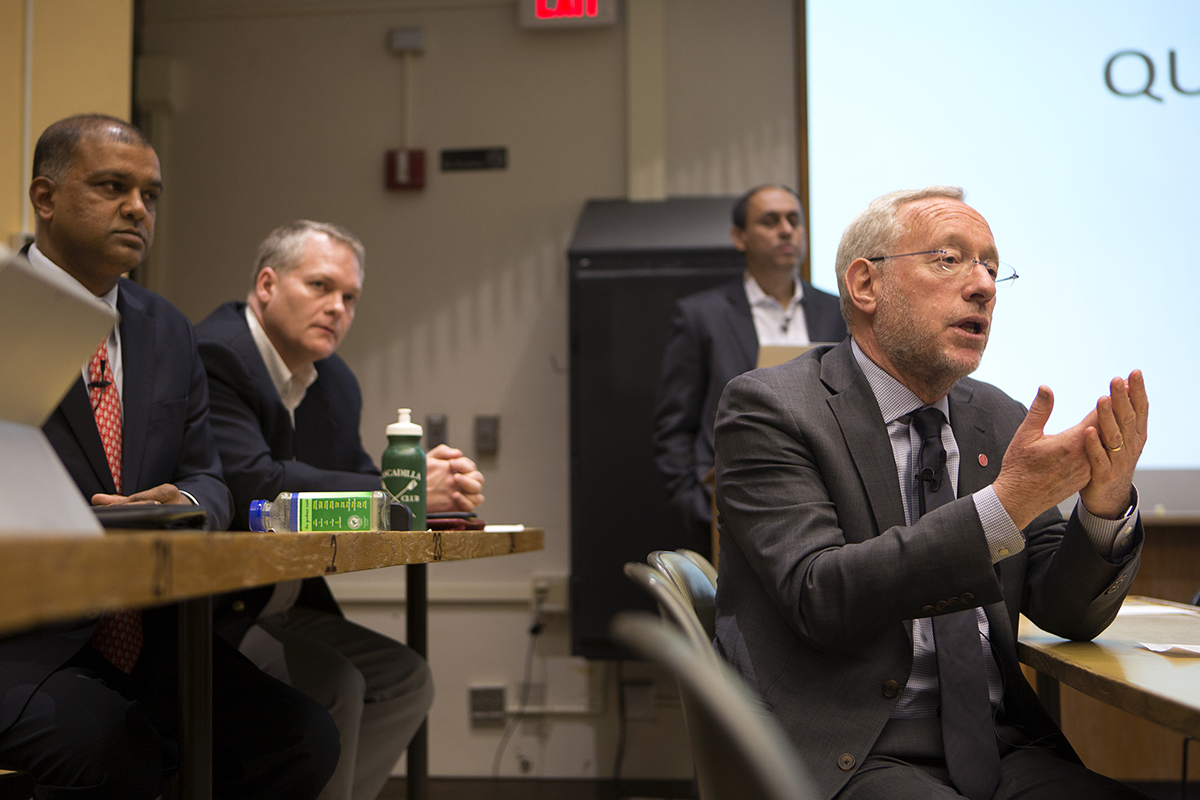With faculty structure proposed, College of Business advances
By Susan Kelley

With the help of nearly 100 committee members from across campus and with faculty governance proposed, the Cornell College of Business is beginning to take shape.
Provost Michael Kotlikoff and college leaders gave a progress report on the college’s development at a forum for faculty and staff May 10 in Malott Hall. The leaders outlined recommendations from seven planning committees of faculty, staff, students and alumni charged with defining the college’s structure and policies. Those recommendations are now posted on the college website along with previous committee reports. The college is on track to launch in the 2016-17 academic year, perhaps as soon as July 1, Kotlikoff said.
Forum for alumni
An online-only open forum for alumni will take place May 19, from noon to 1 p.m. The College of Business leadership will discuss planning committee recommendations that have helped to shape the college thus far. The forum can be accessed here.
Meanwhile, the inclusive process to form the college will continue, said Dean Soumitra Dutta. “If we can tackle some of these very difficult issues collaboratively and come up with reasonable solutions, that should give us optimism for the college’s future,” he said.
A crucial step forward is the governance architecture proposed by the Faculty Governance Committee, said committee co-chair Chris Barrett, who Dutta recently appointed the college’s deputy dean and dean of academic affairs.
“The group began by discussing … what were the things we most passionately wanted to safeguard in each of the three schools, and what were the things that we thought we could derive from partnership with the other schools,” Barrett said.
From that dialogue emerged four governance principles: continuation of each school’s missions and programs, continuation of faculty members’ expectations, college cohesion, and fair processes and outcomes.
That catalyzed a recommendation to organize the faculty in three ways: by school, disciplinary area and multidisciplinary theme. While the schools will be the college’s primary academic units, faculty also will be affiliated across schools in seven areas:
- accounting;
- applied economics and policy;
- finance;
- management and organizations;
- marketing and communication;
- operations, technology and information management; and
- strategy and business economics.
Faculty members may choose to consolidate around multidisciplinary and multi-school themes that draw on Cornell’s strengths, such as entrepreneurship and innovation, and sustainability, Barrett said.
The committee also developed detailed protocols for faculty hiring, reviews, reappointments, promotions and tenure. And an elected faculty policy committee will form in the fall to provide further policy input and oversight.
While other committees put together recommendations, the Communications Synergy Committee ensured the right audiences, from journalists to alumni, faculty, staff and students, got the right information at the right time, said committee chair Joel Malina, vice president for university relations. In the coming months, the committee will address college branding and marketing, he added.
The Staff Synergy Group created guiding principles that focused on the opportunity to enrich and enliven staff members’ jobs, Dutta said. “There was also a strong sense of a commitment by the leadership that we value our current staff, we want to retain them, and we will do our very best to make sure that whatever new opportunities open up are first offered to our staff,” he said. “At the same time … the group also felt their colleagues must understand there is a need for flexibility on their side.”
The group also mapped out 18 areas of operations, administration and support and recommended centralizing, decentralizing or overlapping each one, Dutta said.
Next steps include the appointments of deans in each school. Within four weeks, an interim dean will be announced for the School of Hotel Administration (SHA), selected from the SHA faculty for a two-year term. A permanent dean of the Samuel Curtis Johnson Graduate School of Management will be announced by July 1. An international search for a dean of the Charles H. Dyson School of Applied Economics and Management will start later this month, Dutta said.
He closed by encouraging the Cornell community to create a collaborative culture of mutual trust and respect at the college. “Looking upon our differences as strengths, not weaknesses, and leveraging them so we become not just better but the best in the country, in the world … will raise our aspirations as we look at this very complex project.”
Media Contact
Get Cornell news delivered right to your inbox.
Subscribe